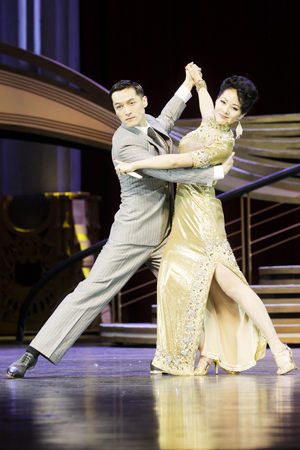
The Eternal Snow Beauty, adapted from Taiwan writer Pai Hsien-yung's novel, is about a Shanghai belle in the 1940s. Photos provided to China Daily
The highlight of the production is the Shanghai dialect, says Ye Changhai, a professor of Shanghai Theater Academy.
Productions in Beijing and Tianjin use local dialects, and Cantonese plays are staged in Hong Kong and Guangzhou, but Shanghai has fallen behind in this field.
Maestro Huang Zuolin (1906-94) directed plays in Shanghai dialect in the 1940s, but Shanghai dialect has disappeared from China's formal theater scene since then, says director Xu.
Xu directed a Shaoxing Opera adaptation of Pai's novella Sister Yu-qing a few years ago. Encouraged by the success of that production, Pai authorized Xu to adapt The Eternal Snow Beauty.
It was Xu who came upon the idea to present it in Shanghai dialect.
Determined to present authentic Shanghai culture in all its glamor, Xu wanted his production of The Eternal Snow Beauty to be elegant, modern and exquisite.
"Shanghai dialect was slightly different at the time of the story - the vocabulary and pronunciation are not exactly the same as we are familiar with. The actors have to spend lots of time practicing their diction."
In the play, the ballroom doorman speaks the Ningbo dialect, the housemaid greets the guest in the Suzhou dialect, and a fortune-teller speaks in the rough northern Jiangsu dialect.
"The dialect livens up the character, enriches the theater performance and immediately makes the play vivid," Zhu, the critic, says.
"The ballroom manager, for example, speaks the language of lower class people working in high society - very convincingly, with the occasional dip of a word in pidgin English."
By Zhang Kun in Shanghai (China Daily)
